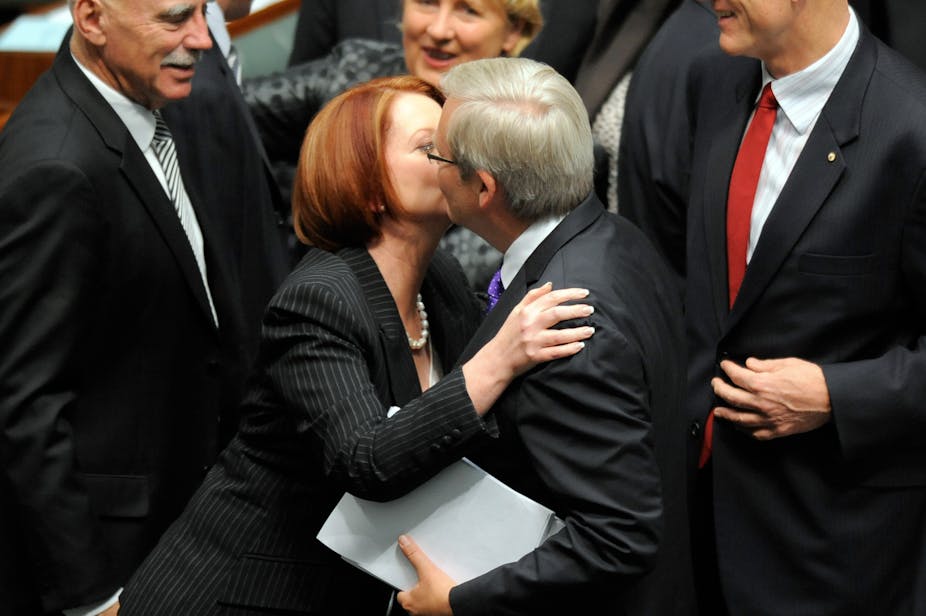Last week demonstrated how fast fortunes may change in politics. Just as the government thought it could get onto the front foot, it experienced a significant setback by not being able to make changes to the Migration Act.
The government had a win in parliament when it passed its carbon tax through the lower house. The achievement was accompanied by government members embracing one another when the result was announced.
The highlight of the celebrations was that kiss between Julia Gillard and Kevin Rudd.
Political shift
Frivolity aside, the passing of the carbon tax hinted to a shift in the political debate.
For the first time since taking office, the Gillard government appeared as though it was capable of passing controversial bills and getting on with the job of governing. Claims that this government was simply “treading water” until the next election were also weakened.
It looked as though the government had reclaimed the political agenda. With the carbon tax through the House of Representatives, the government could seek to brand it as a dead issue to take the heat out of the debate.
The government’s success may also have muddied the waters for the opposition’s attacks on the government.
Opposition danger
Indeed, with the bills now passed, Tony Abbott could fall into a trap similar to the one Kim Beazley fell into after the GST debate.
The promise of “rolling back” the GST by Beazley appeared to become more of a problem for Labor than an asset as the Howard government of the time claimed it would be almost impossible to “unscramble the egg” and dismantle the GST.
Tony Abbott’s promise to discard the carbon tax appears to be facing similar attacks by the government. And, if the issue becomes less important to voters (as the government believes it will), then the opposition leader may appear to be obsessed with old news.
Indeed, focussing on this issue could become a liability rather than a strength for Mr Abbott.
Migration Act failure
But just as the Gillard government was about to enjoy its victory, it experienced a loss when it failed to make changes to the Migration Act.
The implications of the recent decision by the High Court which stopped off-shore processing has given the government limited space to move on this matter.
The failure to change the Act means that asylum seekers must be processed on-shore - a consequence applauded by some of the government’s friends, as well as opponents.
But many see the current system as promoting the people-smuggling trade. There are also concerns that the current system may see an influx of asylum seekers making a voyage to Australia.
The government’s inability to change the Act has been a boon for the opposition.
Weak government
Leaks from cabinet meetings this week also show how the government itself is grappling with dealing with this issue.
This contributes to the broader narrative, promoted by the opposition, that the government is weak and unable to govern effectively.
The problem for the government is that on-shore processing is a major concern to many voters, especially in outer-metropolitan areas. These are precisely the areas that Labor needs supporting it if it is to keep government at the next election.
But by being unable to make changes, the government has opened another front on which it will be attacked.
This is, of course, just as it thought it could move forward after the exhausting carbon tax debate.
Gillard’s prime ministership appeared to have turned the corner when the carbon tax bills were passed.
But failing to change the Migration Act has poured fuel, rather than water, on the spot fires faced by the government.

